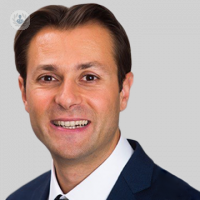Treating tongue-tie: breastfeeding and what to expect from surgery
Written by:Tongue-tie is where the strip of skin connecting a baby's tongue to the bottom of their mouth is shorter than usual. For some babies it doesn't seem to bother them. However, it can often make it harder to breastfeed.

Top paediatric surgeon, Mr Stefano Giuliani, talked to us about breastfeeding when your baby is suffering from tongue tie. He also informed us of surgery as treatment and shared details on what parents and patients should expect from it.
How common is tongue-tie in babies?
Tongue-tie is present at birth in 4 -11% of babies.
How can you feed a baby with a tongue-tie?
Tongue‐tie is often recognised as a cause of poor breastfeeding because the infant is unable to attach or stay latched on. In addition, it can cause the baby to swallow air, to get frustrated about not extracting enough milk and falling asleep prematurely while feeding.
As an infant breastfeeds, the tongue moves with peristalsis over maternal lactiferous sinuses and extracts milk. When the infant's tongue movement is restricted, as is the case with severe tongue‐tie, reduced movements may affect milk extraction, and friction may be present between the tongue or gums and the nipple, causing damage to the nipple and maternal pain.
How do you fix a baby tongue-tie?
Within the first three months of life, the division of tongue-tie is simple and pain free. It requires a cut and separation of the tongue-tie done with scissors by an expert surgeon who can deal with the rare but possible complications.
Can babies grow out of tongue-tie?
No, the tongue-tie will not improve spontaneously. In older children and adults, tongue‐tie has been implicated as a cause of speech delay, abnormal dentition, poor oral hygiene and inability to play wind instruments.
Is tongue-tie surgery painful for babies?
The surgery is not painful as the tongue-tie has no sensation. The baby may cry for a few minutes because he/she needs to be held steady during the procedure. We usually allow the baby to breastfeed immediately, and this is the most effective way to calm down your baby.
What else should be expected from tongue-tie surgery?
For the most common group of patients with this problem (neonates up to three months of age), the tongue-tie can be released very easily during an outpatient consultation using a sterile surgical scissor. Complications, such as minor bleeding, infection and recurrence of the tongue-tie, are rare.
Occasionally the speech can be affected if the tongue-tie has been missed in the neonatal period, and it is blocking the tongue from moving properly during speech. If this is the case, or if the baby is older than three months of age, the surgeon will need to perform a frenulotomy (release of the tongue-tie) with a laser under general anaesthesia. After the frenulotomy, the speech should improve with the help of a speech and language therapist, unless there are other causes for the speech difficulty.
In conclusion, tongue-tie surgery is done for the following reasons:
- To improve feeding in babies
- To improve speech in toddlers when they are struggling with speech because of the tongue-tie
Technique wise, if surgery to treat tongue-tie is done within the first three months of life, that is a straight forward cut done in outpatient clinic. If the tongue-tie release happens later on in life, the procedure will require a a special laser to reduce the risk of bleeding, and general anaesthetic.
For babies, there is no need for painkillers or general anaesthetic.
To find out more about tongue tie surgery or other common paediatric surgeries, you may like to book a face to face or a virtual appointment with an expert paediatric surgeon such as Mr Stefano Giuliani. Visit his Top Doctors profile today for more information.


